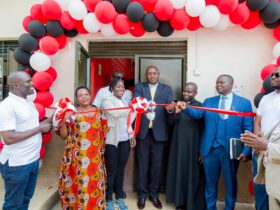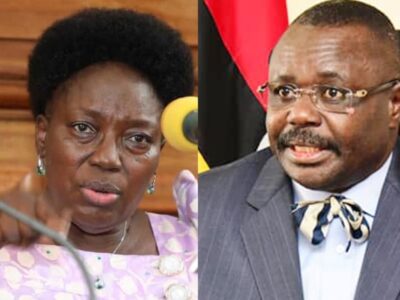The Uganda People’s Defence Forces (UPDF) have reportedly killed dozens of suspected rebels and seized heavy weaponry in a Friday bombardment on new camps of Allied Democratic Forces (ADF) in eastern Democratic Republic of Congo (DRC).
The strikes were conducted using two Sukhoi Su-30 fighter jets and two Mi-24 attack helicopters, according to highly-placed sources, and targeted rebel bases in Tokomeka, Lusubile and Mutwanga, which is on the Congo side of Mt Rwenzori.
Officials were unable to put the precise figure of fatalities or specify the type and quantities of captured arms which two sources separately described as “big weapons”.
In tweets yesterday, President Museveni, who is the Commander-in-Chief of the UPDF, said the air raids were conducted with special permission of the Congolese government outside Shujaa operational territory circumscribed by Beni-Mbau Junction-Eoingeti-Komanda-Kasindi-Beni outline.
Shujaa is a code-name for a joint operation by the UPDF and Congolese army, formally called Forces Armées de la République Démocratique du Congo, launched a year ago with the aim of annihilating ADF outlaws hibernating in eastern DRC.
The success of the military counter-offensive has been mixed, prompting some of Congo’s parliamentarians in Kinshasa and civil society activists in Beni to demand President Felix Tshisekedi sever diplomatic ties with Uganda and kick out UPDF, accusing it of backing advancing M23 rebels against the Congo government.
Kinshasa christens the rebels “terrorists” the same way Uganda brands ADF, which a few years ago adopted the alternate moniker, Islamic State in Central Africa Province (ISCAP), after proclaiming allegiance in online videos to Islamic State, a global terror network.
In multiple tweets last evening, Gen Museveni announced that the Ugandan military had “attacked and destroyed a big terrorist camp of ADF” at three locations that senior government sources placed within the so-called Triangle of Death in eastern Congo.
Without providing numbers or other specifics, he noted that under Operation Shujaa that started on November 30, 2021, the joint UPDF-Fardc troops had “destroyed all the camps the reconnaissance … identified, killed a lot of terrorists, captured others and emancipated the much terrorised wanainchi (ordinary citizens) of the area”.
This pressure, he said, forced ADF fighters to flee to new sanctuaries within mainly North Kivu and Ituri provinces.
“The ignorant terrorists do not know that within just minutes, not hours, we can reach with deadly fire many areas, far beyond the line of limit of exploitation (Shujaa operational territory). Hence, on Friday, they got their deserved reward,” he noted, adding, “Wherever they go, we shall reach them as long as the Congo government allows us to operate with them. Congratulations to the UPDF and congratulations to the government of DRC and the army of Congo.”
The attack hailed by the military as a major feat is the first under Maj Gen Dick Olum since taking over command of UPDF Mountain Division and Operation Shujaa last month from Lt Gen Kayanja Muhanga, now the commander of UPDF Land Forces.
Congo is a familiar territory for Maj Gen Olum – he hails from a West Nile district that neighbours the vast country and has commanded operations inside DRC and was until three weeks ago military advisor at Uganda’s embassy in Kinshasa.
Insiders said these experiences and networks that the Shujaa commander established with Congolese counterparts came in handy in the successful planning and execution of the Friday blistering air raids.
Uganda has been operating in eastern DRC since November 30, 2021 in a regularly-renewed military offensive.
The first ADF camps that the Ugandan army reported to have destroyed in Congo in the early weeks of the military campaign were Kambi Ya Yua, Tondoli, Belu 1 and Belu 2 — all in North Kivu Province.
UPDF marched into DRC, with the consent of Kinshasa, last November following a string of deadly attacks in Kampala that Uganda government blamed on ADF.
Despite reported successes of Operation Shujaa, which we cannot independently verify due to operation area accessibility constraints, ADF rebels continue to be blamed for pillaging of villages and killing Congolese civilians.
On Saturday, a day after the latest air raids were dubbed successful, the group shared a 19-minute propagating their operations and successes in eastern Congo and claimed to have fighters from Uganda, Rwanda, Kenya, Burundi, Tanzania, DRC and other countries in eastern Africa.
Alternately called ISCAP, it vowed to fight what it called infidels to the end, suggesting an ideological shift to its past command-and-control as a regular rebel outfit.
The fluid security situation in eastern Congo has gripped the attention of different stakeholders including the European Union (EU) and United Nations Security Council, with members of the latter on the DRC Sanctions Committee expected to visit on November 15 to assess first-hand compliance with, or violations of, the world body’s sanctions regime regarding the mineral-rich country.
On Saturday, Mr Charles Stuart, the senior Advisor to the EU on Emerging threats in the Great Lakes region, Horn of Africa and Western Indian Ocean, met President Museveni over the deteriorating security situation in DRC compounded by significant battlefield gains by resurgent M23 that Kinshasa says is buttressed by Rwanda. Kigali, like Kampala, denies any mischief.
The EU has promised funding to a nascent East African Community (EAC) Regional Force, to which Kenya deployed a week ago, to pacify eastern DRC by disarming all armed groups alongside fast-tracking a political solution through dialogue.
The M23 coalesced in 2012 to fight against alleged economic exclusion and political suppression of mainly the Tutsi – a tribe that spans multiple countries in the Great Lakes Region.
First Son Muhoozi Kainerugaba, an active-duty UPDF general and immediate past UPDF Chief of Land Forces, last evening lobbed a twitter bomb into the regional efforts by declaring that:
“As for M23, I think it is very, very dangerous for anybody to fight those brothers of ours. They are not terrorists! They are fighting for the rights of Tutsi in DRC”.
The father-son conundrum playing out on the micro-blogging site, one pro-Congo and another propping anti-Kinshasa elements is, according to high-level security and diplomatic sources, confusing Uganda’s stand to internal military strategists and foreign partners at a time of ongoing negotiation to re-hat UPDF troops involved in Operation Shujaa under the regional force.











